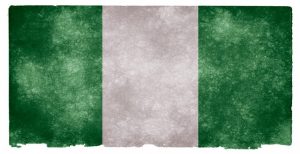The Linguistic Diversity of Nigeria
By Sarah-Claire Jordan
 Nigeria is a country in West Africa that has long been home to many different tribes and kingdoms. The actual country we know today was created by the British, when they merged two different states in 1914. The British ruled indirectly until 1960, when Nigeria became independent. Just 7 years later, civil war broke out and lasted until 1970.
Nigeria is a country in West Africa that has long been home to many different tribes and kingdoms. The actual country we know today was created by the British, when they merged two different states in 1914. The British ruled indirectly until 1960, when Nigeria became independent. Just 7 years later, civil war broke out and lasted until 1970.
The Nigerian Civil War was deeply rooted in the discrimination rampant among the different tribes that inhabited, and still inhabit, the country. The very tribal diversity that contributed to the civil war is exactly what makes Nigeria unique and important as a country. For instance, there are about 521 different languages spoken in Nigeria, though 9 of those are now extinct.
The languages spoken in Nigeria are a representation of all of the African languages, as they are part of all three major African language families: the Niger-Congo family, the Nilo-Saharan family, and the Afro-Asiatic family. English is the official language of Nigeria, but that is more of a remnant of British colonization than a conscious decision to have a non-native official language. Of the different regional languages of Nigeria, the following are probably the most common:
1. Yoruba
Yoruba is also native to Benin, and is part of the Niger-Congo language family. Almost 30 million people speak Yoruba today, and is a tonal language with three different tones. Yoruba is also pluricentric, meaning there are a number of standard versions of the language instead of just one. It is also a dialect continuum, with dialects or varieties grouped into three different categories: North-West, Central, and South-East Yoruba. Separate from this dialect continuum is Literary or Standard Yoruba, which is taught in schools and used by newscasters, though no one considers it the one “standard” Yoruba dialect. One version of the language is used as the liturgical language for the Santería religion.
2. Igbo
This is the language of the Igbo people of southeastern Nigeria and is also part of the Niger-Congo language family. Most of the approximately 24 million speakers live in Nigeria and are ethnically Igbo. A Latin script is used to write Igbo, another reminder of British colonization. Though there are over 20 different dialects of Igbo, though some may be in danger due to dialect leveling. There is a standard literary Igbo language that was introduced in 1972 that was based on two different Igbo dialects. There is a small percentage of Igbo speakers in Equatorial Guinea as well.
3. Hausa
Hausa represents the Afro-Asiatic languages of Africa, along with others of course. It is actually the Afro-Asiatic language with the most speakers, with around 35 million native speakers and 15 million speakers who have learned it as a second language. Native speakers of the language are largely part of the Hausa ethnic group, found in Niger, northern Nigeria, and Chad. It is used as a trade language in West Africa and is spoken by a fair number of people outside of Nigeria, something that can’t be said for either Igbo or Yoruba.
For an overview of our translation expertise, visit our telephone interpreting service page
Category: Foreign Language








